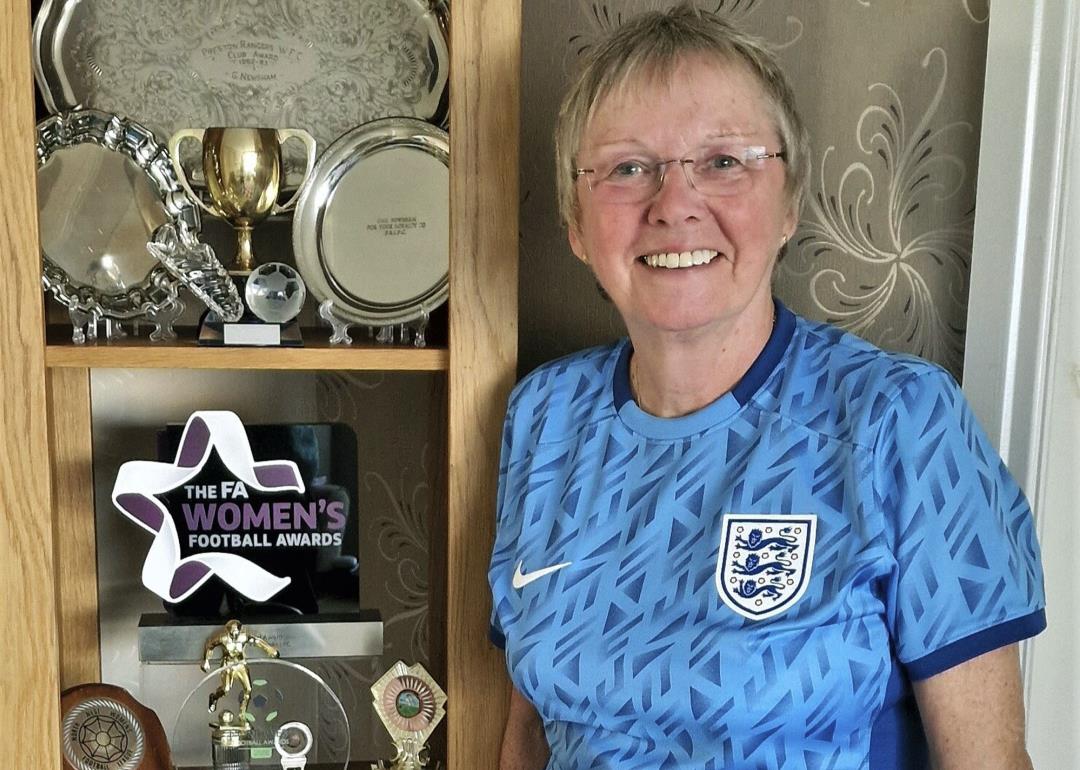
Gail Newsham is filled with joy as England’s soccer team prepares to play in the final of the Women’s World Cup. Newsham, a 70-year-old woman, grew up in a time when women were not allowed to play football in England. However, after the restrictions were lifted, she played a major role in the resurgence of the sport. Now, she eagerly awaits Sunday’s game against Spain, hoping to witness England bring home the world championship. “I’ll be wearing my shirt, I’ll be having a sausage roll and a glass of bubbles,” Newsham exclaimed, proudly sporting her blue England jersey. “That’s what I’ve done every match, so I’m going to do it again on Sunday and cheer the girls on!”
This victory would be a moment of redemption for the women who endured the difficult history of women’s football in England. Gail Newsham shed light on this history when she wrote a book about the Dick, Kerr Ladies Football Club, which thrived during and after World War I. The club emerged as men’s players were engaged in the war, leaving a gap that was filled by women. Women’s teams, some organized at munitions plants, attracted large crowds and raised money for charity. In fact, one match in 1920 drew 53,000 spectators. However, the English Football Association, run by men, reacted negatively to the growing popularity and banned women’s teams from using their facilities in 1921. They argued that “football is quite unsuitable for females and ought not to be encouraged.”
Despite the ban lasting 50 years, Gail Newsham defied the odds and played street football with boys in her hometown of Preston. After the ban was lifted, she spent two decades playing for Preston Rangers on substandard pitches, often without changing rooms or proper toilets. In 1993, the FA finally took responsibility for the women’s game, initiating the slow process of improving funding and facilities. The tide changed after the 2012 London Olympics, when the authorities recognized the global audience for women’s football. Excitement over winning the World Cup is overwhelming for Newsham. “It’s like a Greek tragedy, but with a happy ending,” she said. “The injustice in 1921 was huge, and it took a long time for us to get to where we are now.”
Newsham won’t be alone in her excitement. The Lionesses will be cheered on by countless girls who see them as heroes, and by mothers and grandmothers who celebrate the progress that has been made. England’s only World Cup title to date was in 1966, when the men’s team won. “The Lionesses give us hope – to all of us, boys and girls, women and men,” said Huda Jawad, a member of a fan group called the Three Hijabis, known for their Muslim headscarves. She believes the team represents something to look forward to, something to be proud of, and demonstrates that football and society can be joyous, equal, and hopeful, fostering community, friendship, and solidarity. Spain will also be competing in its first women’s final. The game will take place in Sydney at 8 pm local time, which is 6 am EDT in the US, according to the AP.
(Read more Women’s World Cup stories.)
Denial of responsibility! VigourTimes is an automatic aggregator of Global media. In each content, the hyperlink to the primary source is specified. All trademarks belong to their rightful owners, and all materials to their authors. For any complaint, please reach us at – [email protected]. We will take necessary action within 24 hours.


